Faculty Books
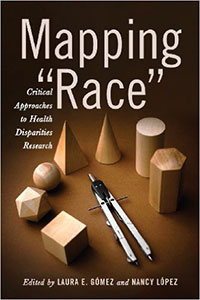
Mapping "Race": Critical Approaches to Health Disparities Research
Dr. Laura E. Gomez, Dr. Nancy Lopez
Available for purchase here.
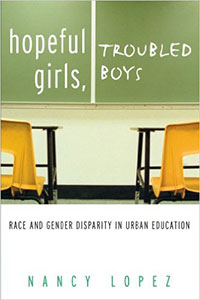
Hopeful Girls, Troubled Boys: Race and Gender Disparity in Urban Education
Nancy Lopez
Available for purchase here.
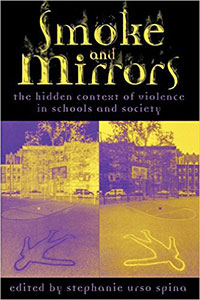
Smoke and Mirrors: The Hidden Context of Violence in Schools and Society
Ricky Lee Allen (Contributor)
Available for purchase here.
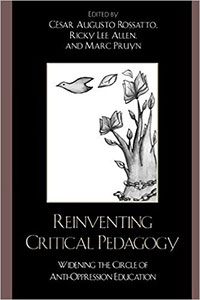
Reinventing Critical Pedagogy: Widening the Circle of Anti-Oppression Education
Ricky Lee Allen
Reinventing Critical Pedagogy offers a fresh perspective from which to read, discuss, and debate recent critical interpretations of schooling and our world at present.
The authors build upon past accomplishments of critical pedagogy and critique those elements that contradict the radically democratic orientation of the field.
Ultimately, they argue that critical pedagogy needs to welcome a wider representational and ideological base for the oppressed, and that it should do so in a way that makes the field more vital in the preparation for the revolutionary struggles ahead.
Reinventing Critical Pedagogy takes a step in that direction because it not only takes to task "external" forces such as capitalism, patriarchy, and white supremacy, but also engages the manifestations of these external forces within critical pedagogy itself.
Available for purchase here.
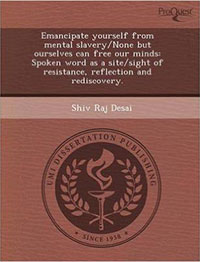
Emancipate Yourself from Mental Slavery/None But Ourselves Can Free Our Minds
Shiv Raj Desai
In a world where voices of youth are increasingly being shunned via high stakes testing, zero tolerance school policies, and public opinion that supports punishing youth with more severe penalties, adolescents have very few opportunities to open up and have their voices be heard.
However, young people have found spaces to share their most personal and critical ideas of their world by writing, reading, sharing and performing spoken word poetry, which is a poetic form that combines performance with rhythmic flow.
Over the last few years in my graduate study, I have witnessed the power of high school students who utilize this art form to express themselves. I have watched them grow as critical thinkers and rely on their poetry to (re)discover themselves, reflect on their conditions and resist dominant ideology. Thus, the focus of my dissertation study is threefold:
- To explore how spoken word is a community and student-centered practice which provides members a critical educational space to examine the world more critically by questioning issues of race, class, and gender
- To investigate how students are utilizing spoken word in an anti-colonial/decolonizing framework that promotes alternative forms of knowledge and engages students in a self-reflexive process
- To examine how spoken word can be utilized as a critical teaching tool that fosters critical consciousness ( emancipating the mind from mental slavery), dialogue, and action.
In order to answer these research questions, I am utilizing a decolonizing methodology (Smith, 1999) design that will draw upon three approaches:
- Participant observations
- In-depth case studies
- Examine student artifacts
I rely on Critical Race Theory, Resistance Theory, Critical Literacy and an Anti-colonial framework to guide the methodology and interpretation in this study.
Available for purchase here.
